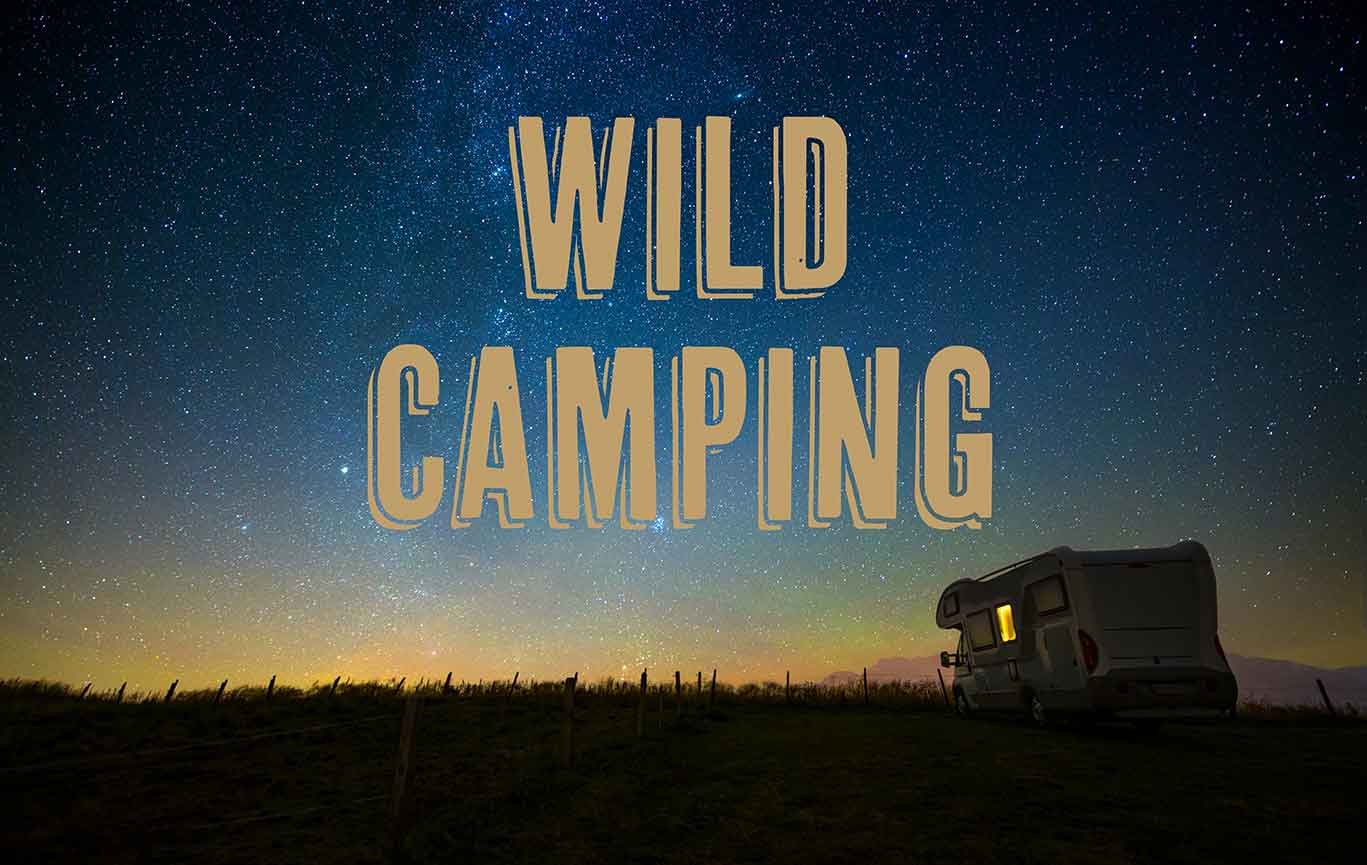A Beginners guide to camping in the wilderness or, if you must, that quiet bit of the Lidl carpark.
Some of my most memorable evenings have been when we are tucked away in a quiet wild camping place enjoying the sights and sounds of nature without another family parked a regulation 6m away from us. There are thousands of beautiful locations all around the UK and mainland Europe where we can wildcamp. Just a little exploration will turn up some lovely spots that you’ll want to keep all to yourself.
When I use the term Motorhome Wild Camping I do not mean ‘Wild Parking’ which is the practice of parking up in service stations or a Tesco’s car park. For Motorhome Wild Camping Think “Wilderness Camping” and you’ll see where I’m coming from. Of course in the UK and in Europe you’ll find it hard to find many true wildernesses but that shouldn’t stop you looking and you will often be surprised at what nice places you can find to stay for an evening just by following your noses.
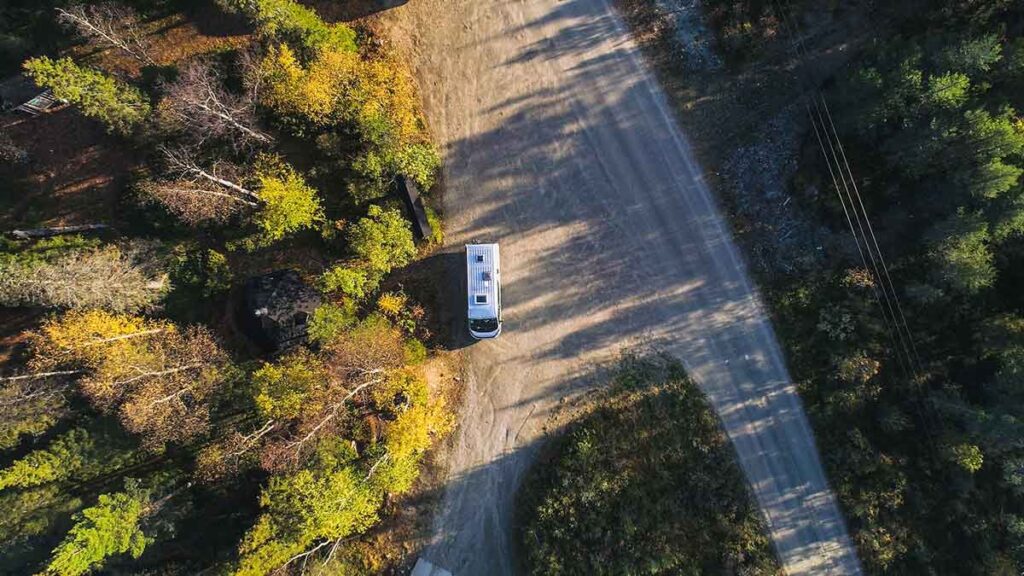
Scenic vistas that include lakesides, deserted beach roads, dam bridge-heads, riversides and hilltops; I’ve camped on them all. No matter how remote the location the motorhome gives us all the comforts of home. All of the great explorers of yesteryear could have only dreamt of the machines we now take for granted that allow us to camp miles away from civilisation but in such comfort.
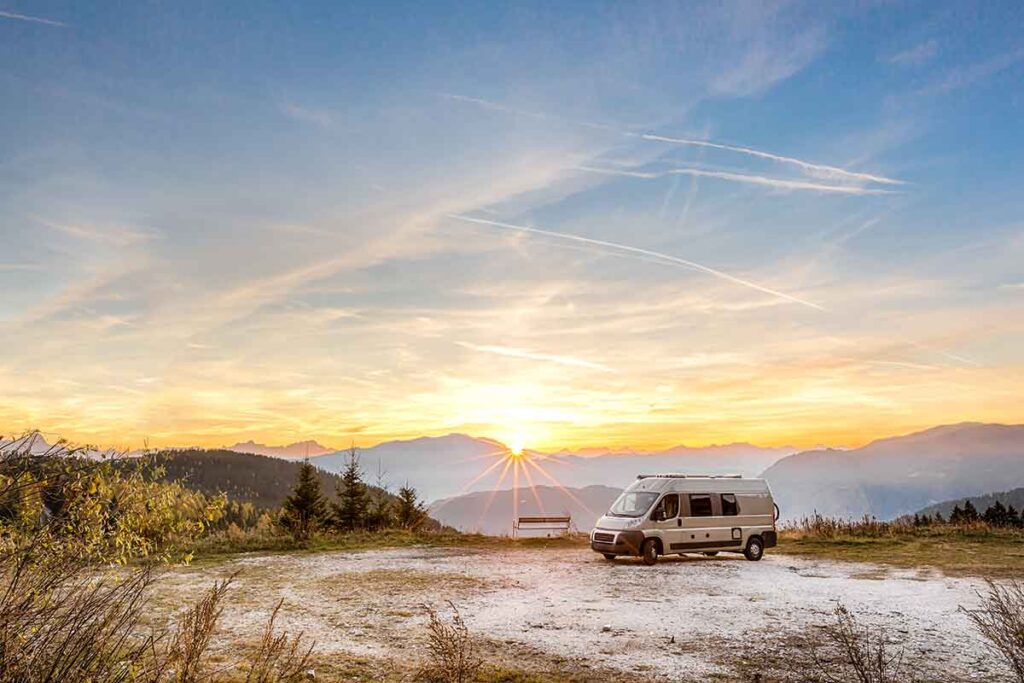
Motorhome wild camping is not about saving money, it is about parking up in quiet locations that for a night or two you can enjoy and call your own. In my opinion, some confuse wild camping with free camping. There are legions of people who proudly boast they never, ever pay to camp, they will park anywhere. If they have a nice location its a bonus, but if it’s tucked around the back of the cement works, as long as they are not paying, that’s good. The difference between me and them is that I would pay to camp on a nice isolated bit of headland. I don’t wildcamp to save money, I wildcamp because I like camping in nice places on my own.
Keeping a low profile
Some countries forbid any type of wild camping in motorhomes and insist that tradition campsites are used. However, in most countries in Europe, it is not against the law for you to sleep in a public place in your motorhome. That said, while there might be no blanket camping ban; most countries, including the UK, have local laws that might prohibit camping in particular areas.
Signs will be placed informing you, so look out for them. There are plenty of irresponsible people among the motorhoming community and they break simple rules, like staying for far too long and producing noise and mess. This is why we are seeing increasing numbers of those infernal “camping prohibited” signs appearing.
The key to successful motorhome wild camping is to keep as low a profile as possible. If the Police swing by and see your “camp” is complete with deck-chairs, washing line, awning and a large black sack off rubbish, they are probably going to bang on your door and ask you to move on.

No Overnight Camping
I admit I have camped in plenty of places where it was prohibited. But more often than not, this has been ‘out of season’ when I guessed rules were not as strictly as enforced as in high (tourist) season; also, I usually stay only one night. However if I find somewhere really good and I want to stay longer, I might move somewhere else during the day and then return later in the day or early evening. This keeps the profile low and the chance of being moved on is remote.
A few motorhome Wild Camping rules to live buy.
- Think Security- Don’t park in an area that might be frequented by low-life, conversely a remote location can bring its own problems.
- Damage nothing. Most land belongs to someone, do not remove branches or damage crops. Don’t use BBQs with a risk of fire, etc.
- Don’t make a camp of it. Deck-chairs, awnings and windbreaks should not be used unless you are extremely remote and not overlooked.
No Litter – not even in bags.
Store your litter inside. The practice of putting it under the motorhome in a black sack looks awful, chances are an animal opens the sack and spreads litter everywhere.
Always try to avoid camping in-sight of a house, it’s not always possible but where it is, it’s best done. These homeowners are normally the first to call the police.
Never let waste drip onto the ground. We all know that a little grey water won’t harm the environment, but if the public sees the liquid coming out of your motorhome, they often assume the worst.
Dispose of sewer waste responsibly. Never assume that a manhole is for black-waste, it might not be. An extra cassette to double your black waste is always a good idea. You can buy storage solutions for these so they fit under the motorhome.
Life Support
While you might get a free pitch, peace and quiet with a view to die for, that’s about it, there will be no other facilities. The other basics for life we need to have with us.
We need to cope without an electric hookup, fresh water or sewer. Americans call this dry-camping. When camped on a site you are just yards away from copious amounts of fresh water and somewhere to dump waste and have access to as much electricity as you need. When camping in the wild we must be self-sufficient and we have to think things through a little, or we can quickly run short of an essential and have to cut short our camping.
If you are wild camping over two or three days, then you must use your resources sparingly.
You will know from experience how long you can be away from a hookup; if you use a generator and/or solar panels, this might be indefinite. However, black and grey tanks need filling and emptying. I know a couple who wild in a large American RV who can almost go over a month before the 75gallon black tank is full. If you have a two-gallon toilet cassette, then you will need to give more frequent, responsible, disposal some serious thought. The trick is to arrive somewhere completely full with fresh water with all your waste empty. Wild campers need to manage fresh and wastewater responsibly.
Freshwater
It is a good idea for regular wild campers to fit a water filter, that way if you are ever not sure about the quality of the water you fill up with it is not really a concern.
The less water you use, the slower your grey tank will fill so use fresh water sparingly. If you really want to eke out the last of your water, there are lots of water saving tips.
Don’t waste that 4 pints of water while you’re waiting for your shower water to get to temperature, catch it in a bucket, and you can put it back in your tank, or use it to rinse dishes, etc.
Before washing up, clean plates and cutlery thoroughly with tissues, this will ensure you use much less water.
Learn how to shower using the minimum of water, wet yourself, turn off the tap, soap up, then a quick rinse and repeat.
Wet wipes add to your dry waste, but can save a lot of water, when washing face and hands, never flush these, even the flushable ones.
Depending on where you are, it can be difficult getting your water tanks refilled. Many wild campers just book onto a campsite one day in five and replenish, some full-time wild campers refuse to pay for sites and they track down their water at graveyards, garages and service stations, etc. As water meters become more widespread, finding free water will become harder.
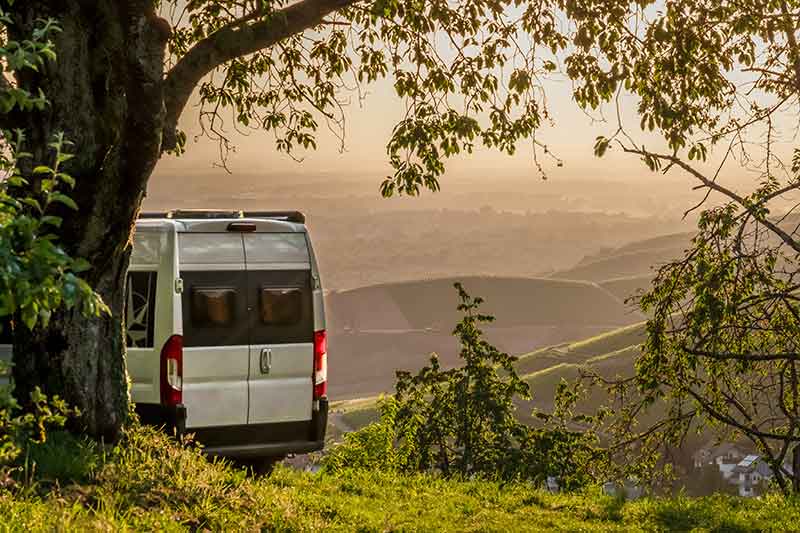
Gray Waste Disposal (dishwater shower water)
When wild camping grey water (washing and washing up water) is the easiest waste to get rid of, you’ll know you’re full when the shower won’t drain or has dishwater in it. You are probably aware that grey water can smell worse than black! So it’s best to dump it well away from where you are camping. Ideally this will be at a designated area at an aire or campsite, but sometimes it’s necessary to lose some in the wilderness. If this is your plan, then ensure that you use environmentally friendly soaps and detergents. Getting rid of it into a hedge line or in some scrub or field will not do any harm, especially if it’s a one-off. However, too much grey in one place will harm vegetation and get very smelly, so spread it around. Never just let it drain through a dump hose. It looks terrible, and the public will complain.
Black waste. (pee and poo)
Black waste must be disposed of responsibly, it MUST end up in a sewer. Some wild campers play hunt the manhole and are happy to dump waste there. This is irresponsible, only use manholes you know for certain lead to a sewer. Many manholes are not for sewers, and contaminating them is unacceptable.
Some bury waste, and this may be the only option in a true wilderness, waste that has no added chemicals buried at least 18/24 inches deep will compost and harm no one. Years ago, in another life, I recall we could dig a latrine in a wooded training area, a large communal toilet, this was used by many men for days on end, once filled back in you would never know it was there, and on subsequent visits a year later, a latrine could be dug in the same area and there would be no evidence of last years evacuations, just a lush compost. However, if you bury waste, you must be absolutely sure that you are not readily contaminating a watercourse.
When some are away from a main sewer for a while they resort to peeing outside and pooing into plastic bags, stretching the bag over the rim of the loo, this bag will also
hold the paper wipes then securely sealed it’s stored in an outside locker for later disposal. Personally, I am never that far away from a sewer and would rather not carry around giant size equivalents of a Doggy Doo bag!
Emptying in Public loos.
This is easy enough to do, but if you are emptying while someone is in the next cubicle then expect them to be horrified as they hear 3 gallons spladooshing into the bowl. When wild camping a lot we used to carry an old rucksack that would take a full cassette, this we could carry into public loos and empty. Splashes were sometimes inevitable, so in one of the side pockets were a small spray bottle of disinfectant and some loo roll to clean up.
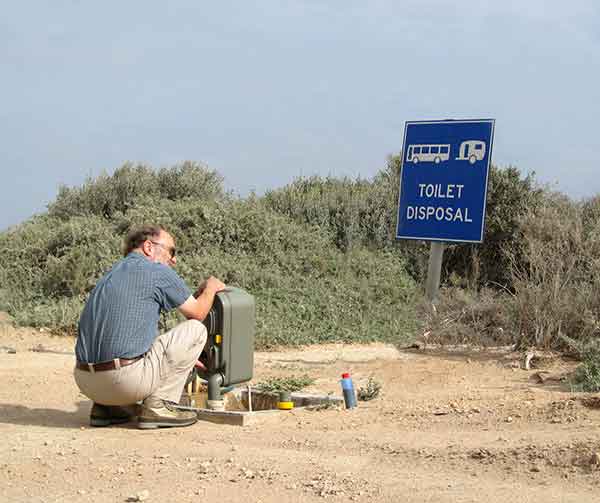
Saving on Electricity
In the summer for occasional wild camping, you can get by for a few days on just a single battery and no hookup. Most regular wild campers will be well geared up to go for long periods without a hookup. They may have a combination of extra batteries, solar panels, and generators. They will have procedures in place to keep their use of electricity to the bare minimum. Aware that a motorhome without power is no better than a good quality tent! If you wild camp a lot you can spend a lot of money on portable power, today’s technology is such that as long as you have money, you can stay off grid indefinitely.
Alcohol and the Wild-camper
When wild camping you should consider that at any time you might be asked to “move on” by the landowner or even the police. For this reason, you should always be fit to drive when camping in a public place.
In the UK and some European countries there is a “drunk in Charge” law so you commit an offence just by being in charge of a vehicle when over the driving limit. If they charged you with this offence, then you would have to prove that your intentions were to sleep and not drive. One would hope that a Police Officer would use common-sense when seeing you in your pyjamas and realise you have no intention of driving. However, common-sense seems to be less common these days, so the advice has to be; do not drink too much and wild camp.
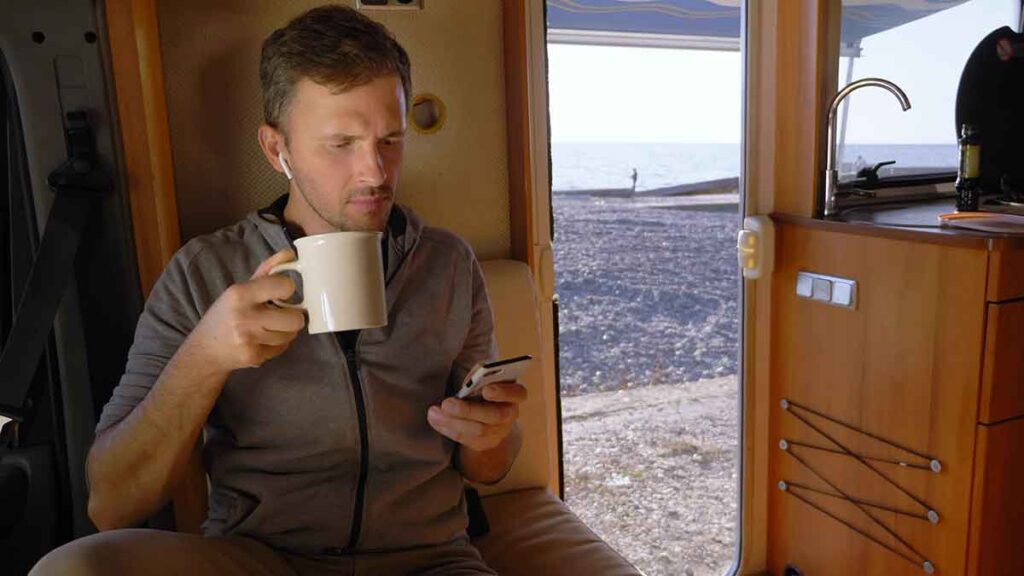
Motorhome wild camping – the backlash
While there are those individuals that campaign tirelessly on our behalf; who write letter after letter to local authorities informing them of the benefits that a visitor in a motorhome can bring. However, a few selfish motorhomers are shouting louder and ruining some locations for the majority.
These FLT’s can often be seen parking in the same spot for days on end with rubbish bags stuffed under the motorhome, generators running and deck chairs out. This behaviour angers locals who wonder where these long-termers are dumping their more toxic waste! Campers get reported for more spurious reasons that might include noise or ruining views. The result is almost always the same; they erect a sign stipulating “No Sleeping” or “No Overnight Camping” It’s only a matter of time till almost every beauty spot has one of these signs
Wildcamping – Give it a go
Wild camping is fantastic. It can mean that yours are the only footsteps on a beach. Imagine how nice that cup of tea tastes when you are the only person seeing the early morning mist on a lake, and the only sound is birdsong. It is not dangerous, and with the application of the common sense tips above, wild camping is no more dangerous than living in the country. The modern motorhome makes wild camping so easy. Please give it a go.
You can discuss this article here


